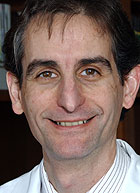Research into a variety of debilitating pediatric diseases will continue at the School of Medicine thanks to a $2 million grant from the National Institute of Child Health and Human Development.
The grant, awarded to only a few pediatric centers nationwide, will fund the Child Health Research Center (CHRC) for the next five years.

The CHRC focuses on developing the careers of young physician-scientists in human developmental biology, genetics and genomic medicine and on bringing together basic science and clinical medicine to improve child health.
The grant provides funding for two- or three-year pediatric research opportunities to physician-scientists who have finished their residencies or fellowships.
The scholars work to better understand the pathology of diseases and evaluate new treatments through two core School of Medicine facilities — the mouse genetics core and the zebrafish core.
“Both core facilities allow us to carry out biological studies in animal models of human disease to understand the mechanisms that cause disease and to develop therapeutic and translational strategies,” said Alan L. Schwartz, M.D., Ph.D., the Harriet B. Spoehrer professor and chairman of the Department of Pediatrics and Children’s Hospital pediatrician-in-chief.
Louis J. Muglia, M.D., Ph.D., director of the CHRC and professor of pediatrics, of molecular biology and pharmacology and of obstetrics and gynecology, said the funding offers a variety of opportunities for its scholars.
“Not only is there the opportunity to develop their work and their labs, but there is also the opportunity for mentorship and networking with the other scholars nationwide,” Muglia said. “While the research that is being done is very broad, it is all centered on pediatrics, and there is not enough of that being done around the country.”
Of the 23 scholars that have been funded since the program began in 1996, 17 are on the School of Medicine faculty. Muglia was one of the scholars that received funding in earlier years of the grant.
“Over the last decade, there has been an explosion in genetics and genomic science,” he said. “The goal has been to integrate advances in genetics and genomics with developmental biology and combine that with educating the best people to apply those advances.”
Current trainees in the program are Tony French, M.D., Ph.D., assistant professor of pediatrics and of pathology and immunology; David Hunstad, M.D., assistant professor of pediatrics and of molecular microbiology; Patrick Jay, M.D., Ph.D., assistant professor of pediatrics and of genetics; Joshua Rubin, M.D., Ph.D., assistant professor of pediatrics, of neurology and of neurobiology; and Fei Fang Shih, M.D., Ph.D., assistant professor of pediatrics and of pathology and immunology.
Rubin said the funds have been a crucial element of support for him during the critical first few years of his independent laboratory investigation, which focuses on brain tumors in children.